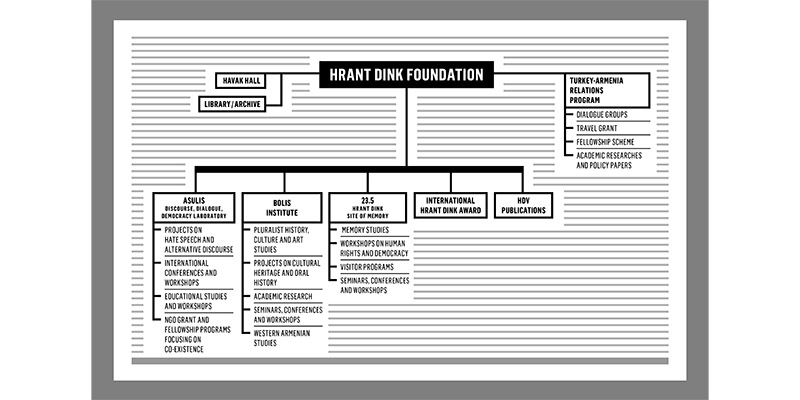Hrant Dink Foundation was established in 2007 after the assassination of Armenian journalist Hrant Dink, the editor-in-chief of the Armenian newspaper Agos to continue his legacy and dreams. HDF defines the development of a culture of dialogue, empathy and peace as the basis of all its activities. Demand for democracy for people from all ethnic, religious, cultural and gender backgrounds is a core principle for HDF. The foundation has several aims such as supporting Turkey’s democratization process and to contribute to the promotion and protection of human rights, minority rights and cultural rights; defending equality and equal citizenship; promoting intercultural dialogue, eliminating all forms of discrimination including ethnic, religious and gender equality and encouraging the society to embrace a culture of peace, co-existence and mutual understanding.
HDF operates its activities under Asulis Discourse, Dialogue and Democracy Lab, Bolis Institute, 23.5 Hrant Dink Site of Memory and Turkey-Armenia Relations Programme.

ASULIS
ASULIS is Turkey’s first social sciences lab specializing in combating discrimination and promoting discourse studies. It aims to be a leader in confronting discriminatory discourses and fostering human rights, democratization, equality, and pluralism. Its projects raise awareness on hate speech and discriminatory discourse, support human rights organizations, and develop inclusive discourse programs. Screening the media for hate speech, facilitating discussions about the borderline between freedom of expression and hate speech, developing an AI tool to detect hate speech in Turkish are among some of the projects under ASULIS. Additionally, ASULIS organizes learning programs such as Democracity and workshops for all ages on identifying hate speech and building inclusive discourse.
BOLIS
Bolis is dedicated to fostering alternative interdisciplinary studies in history, sociology, and culture. It champions plurality, free from nationalism, racism, and sexism, and contributes to the training of researchers in Turkey. BOLIS aspires to be a hub for pluralistic and democratic historiography, inclusive cultural projects, and activities that recognize and preserve multicultural heritage. Among current projects are Minority Rights Academy, KarDes mobile app that serves as a tour guide to the multicultural heritage of cities, and building archives on the inventory of community structures like churches, synagogues, schools, hospitals, orphanages, and cemeteries. The foundation also archives oral history interviews and collects, digitizes, and catalogues personal archives, photographs, documents, and books to contribute to collective memory.
23.5 Hrant Dink Site of Memory
Hrant Dink, the Armenian editor-in-chief of Agos Newspaper, was assassinated in Istanbul in front of his newspaper’s office on January 19, 2007. Following his assassination, the newspaper office gained an important symbolic meaning and powerful presence in the collective memory and collective conscience of the society. The memory site, while shedding light on Hrant Dink’s life, struggle, the days leading to his death as well as the story of Agos and minorities in Turkey, offers a look into the near history of Turkey. 23.5 promotes the universal values embraced by Hrant Dink such as democracy, co-existence, equality, truth, peace and justice. With its exhibits, archives and public programs, 23.5 acts as a space for remembrance, reflection, dialogue, activism, learning and mutual understanding. The 23.5 Hrant Dink Site of Memory was awarded the 2023 Kenneth Hudson Award for Institutional Courage and Professional Integrity at the European Museum of the Year Awards Ceremony, which has been given by the European Museum Forum since 1977.
International Hrant Dink Award
Since 2009, the Hrant Dink Foundation presents the International Hrant Dink Award on Hrant Dink’s birthday, September 15th. The Award aims to remind those individuals, organizations and groups who give inspiration and hope to people for holding on to their struggle, work for a more free and just world, free from discrimination, racism and violence, take personal risks for achieving those ideals and use the language of peace that they are not alone. Each year the award is granted to two individuals, organizations or groups; one from Turkey and one from outside of Turkey.
Turkey-Armenia Relations Program
The border between Turkey and Armenia is closed since 1993. The Foundation strives to eliminate mental and physical borders between the two neighboring countries by promoting direct contact and cooperation with the Travel Grant, Fellowship Scheme, dialogue groups and research projects. The Foundation continues to expand its activities to increase people-to-people contact, promoting cooperation among professionals, organizing exchanges for various experts and raising awareness on the impact of the sealed border though coordination in Turkey and Armenia.
